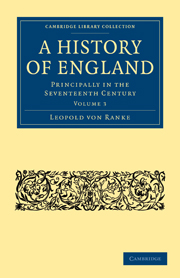Book contents
- Frontmatter
- Contents
- BOOK XI THE COMMONWEALTH IN ENGLAND, 1649—1653
- BOOK XII THE PROTECTORATE OF OLIVER CROMWELL, 1653–1658
- CHAP. I Oliver Cromwell and his elevation to the Protectorate
- CHAP. II Embassy to Sweden. Peace with Holland
- CHAP. III The Parliament of 1654
- CHAP. IV Military government. Religious tolerance
- CHAP. V Rupture with Spain
- CHAP. VI The Parliament of 1656, 1657. Idea of a Cromwellian Monarchy
- CHAP. VII The general position of the Protectorate at home and abroad in 1657 and 1658
- CHAP. VIII Death of Oliver Cromwell
- BOOK XIII FALL OF THE PROTECTORATE AND THE COMMONWEALTH. RESTORATION OF THE MONARCHY, 1658—1660
- BOOK XIV THE FIRST FIVE YEARS UNDER CHARLES II. THE RESTORATION OF THE ANGLICAN CHURCH
- BOOK XV THE DUTCH WARS OF CHARLES II. ESTABLISHMENT OF THE PROTESTANT AND PARLIAMENTARY CHARACTER OF THE CONSTITUTION 1664—1674
CHAP. VIII - Death of Oliver Cromwell
Published online by Cambridge University Press: 07 June 2011
- Frontmatter
- Contents
- BOOK XI THE COMMONWEALTH IN ENGLAND, 1649—1653
- BOOK XII THE PROTECTORATE OF OLIVER CROMWELL, 1653–1658
- CHAP. I Oliver Cromwell and his elevation to the Protectorate
- CHAP. II Embassy to Sweden. Peace with Holland
- CHAP. III The Parliament of 1654
- CHAP. IV Military government. Religious tolerance
- CHAP. V Rupture with Spain
- CHAP. VI The Parliament of 1656, 1657. Idea of a Cromwellian Monarchy
- CHAP. VII The general position of the Protectorate at home and abroad in 1657 and 1658
- CHAP. VIII Death of Oliver Cromwell
- BOOK XIII FALL OF THE PROTECTORATE AND THE COMMONWEALTH. RESTORATION OF THE MONARCHY, 1658—1660
- BOOK XIV THE FIRST FIVE YEARS UNDER CHARLES II. THE RESTORATION OF THE ANGLICAN CHURCH
- BOOK XV THE DUTCH WARS OF CHARLES II. ESTABLISHMENT OF THE PROTESTANT AND PARLIAMENTARY CHARACTER OF THE CONSTITUTION 1664—1674
Summary
Such was the position of the Protector in the spring and summer of 1658. He enjoyed an unbounded prestige in Europe, and held the supreme power in Britain; yet in neither respect had he fully attained his object.
In England he had hitherto overpowered and crushed every enemy—the Scottish and the Presbyterian system, the peers and the King, the Long Parliament, and the Cavalier insurgents: but to create within the very party which owed its existence, or at any rate its supremacy, chiefly to his assistance, an organisation consistent with the authority which had fallen to his own lot, was beyond his power.
Even among his old friends in the separatist congregations, his comrades in the field, his colleagues in the establishment of the Commonwealth, he encountered the most obstinate resistance.
He was resolved not to tolerate it. To none of the officers who had declared against him did he show any mercy. The most determined were thrown into prison, the rest dismissed from the army. Some among them had belonged to the original company of which Cromwell had been captain. They could not conceive that it was a crime to refuse the title of House of Lords to a house which did not consist of lords. But Cromwell now demanded unconditional submission. Formerly it had been necessary to form his troops of believers in order to encounter the Royalists. He now saw in every independent opinion an ally of the Royalist cause.
- Type
- Chapter
- Information
- A History of EnglandPrincipally in the Seventeenth Century, pp. 204 - 216Publisher: Cambridge University PressPrint publication year: 2010First published in: 1875

